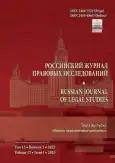Международные рабочие группы ― перспективная форма международного взаимодействия в целях достижения долгосрочного устойчивого результата
- Авторы: Плохов С.В.1
-
Учреждения:
- Генеральная прокуратура Российской Федерации
- Выпуск: Том 12, № 1 (2025)
- Страницы: 69-74
- Раздел: Международно-правовые науки
- Статья получена: 17.03.2025
- Статья одобрена: 18.03.2025
- Статья опубликована: 29.04.2025
- URL: https://journals.eco-vector.com/2410-7522/article/view/677293
- DOI: https://doi.org/10.17816/RJLS677293
- ID: 677293
Цитировать
Аннотация
В условиях глобализации и роста транснациональной преступности возрастает потребность в эффективном международном взаимодействии правоохранительных органов. Одной из перспективных форм такого сотрудничества является создание международных рабочих групп. Они обеспечивают более высокий уровень координации, обмена оперативной информацией и совместного планирования действий, что способствует повышению законности и безопасности на международном уровне. Целью стало исследование практики создания и функционирования международных рабочих групп с участием Генеральной прокуратуры Российской Федерации и зарубежных компетентных органов, а также выявление их преимуществ и перспектив развития. Рассматриваются конкретные примеры взаимодействия с Белоруссией, Ираком, Ираном, Монголией и Узбекистаном, анализируются их механизмы формирования, предмет деятельности и достигнутые результаты. Создание международных рабочих групп позволяет существенно повысить эффективность борьбы с преступностью, предотвращать правонарушения, улучшать обмен опытом и оперативной информацией между странами. В отличие от программ и планов сотрудничества такой формат взаимодействия характеризуется устойчивостью, регулярностью и персональной вовлеченностью участников, что делает его более результативным. В статье обосновано, что международные рабочие группы являются перспективным инструментом международного сотрудничества, способствующим укреплению международной безопасности и правопорядка. Исследование представляет интерес для специалистов в области международного права, прокурорского надзора и межгосударственного сотрудничества.
Полный текст
Об авторах
Сергей Владимирович Плохов
Генеральная прокуратура Российской Федерации
Автор, ответственный за переписку.
Email: s4286@mail.ru
ORCID iD: 0009-0001-6311-0640
SPIN-код: 1539-9875
канд. юрид. наук
Россия, МоскваСписок литературы
Дополнительные файлы








